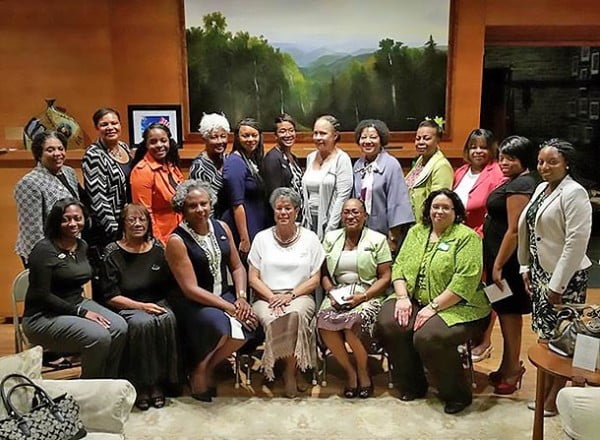Day of Prayer for Mental Health Recovery

Jewel Wilson, Sharon Pitts, Jacqueline Nightingale, Marion Thompson, Jacqueline Baker,
Je’wana G. McEachin, and Dahlia Hylton. Seated: Raynetta Waters, Gloria Gilliam, Sharon West, Diane Mance, Viola Spells, and Carol Goins. Photo: Urban News
The Asheville Chapter of the Links Incorporated & NAMI WC Launch a New Partnership.
The Links Incorporated, under the leadership of President Glenda Newell-Harris, MD have recently begun a National Mental Health Initiative “to educate its members and the greater community about mental health concerns such as depression, anxiety, and social issues that impact our physical and mental health.” The goal is to help eliminate the stigma of mental illness within the black community, and educate people about how to seek and find treatment.
To this end the Asheville Chapter of the Links Incorporated, under the leadership of President Diane Mance, has recently partnered with the National Alliance on Mental Illness of Western Carolina (NAMI WC).
A National Day of Prayer for Mental Illness Recovery and Understanding was jointly sponsored under the leadership of Links Incorporated and Human Services Committee Chairperson Je’wana Grier-McEachin and committee and NAMI WC member Sharon Pitts.
Other Link Incorporated committee members are Myrna Casey, Marion S. Thompson, and Sharon West. The Gamma Gamma Omega Chapter of Alpha Kappa Alpha Sorority, Incorporated, also a NAMI WC partner, supported this initiative.
The Interdenominational Ministerial Alliance, the Baptist Ministers Union and other ministers of Black churches were encouraged to choose a Sunday in early October to pray for mental illness recovery and understanding for individuals facing mental health challenges and their families. Churches were also encouraged to distribute a resource guide for seeking treatment.
Mental health challenges can happen to anyone. One in four people will experience a mental health challenge in their lifetime. For one in seventeen, the challenges will be severe and persistent.
Two things have long been known about people needing help for mental health challenges:
- stigma is the number one barrier that discourages them from seeking the help they deserve;
- some mental health concerns can be improved by talking with friends. Other mental health concerns may require professional help. When African Americans seek help they are much more likely to approach their pastor or primary care doctor rather than a mental health specialist (e.g. pastoral counselor, psychiatric social worker, psychologist, or psychiatrist).
Important Facts about Mental Health Recovery
- Recovery does not take place in isolation. It takes place in the community. Supportive communities take many forms such as families, churches, clubs, work places, volunteer sites, and therapeutic programs. It is important to not become house-bound in isolation.
- With the use of therapy, community support, and new medicine, improvement in mental health is now possible. Like any other illness, recovery takes time. There are no quick fixes. The rate and amount of improvement will vary among individuals. As with any other illness, early detection and treatment promote the best outcomes.
- Recovery is a process that takes place over years. The steps in recovery are seldom straightforward. Periods of relapse are to be expected from time to time during the recovery journey. It is important not to feel defeated when setbacks occur.
For more information, please call (828) 505-735 and visit www.Nami.org or www.namiwnc.org.








